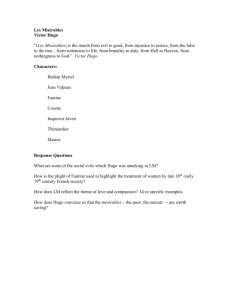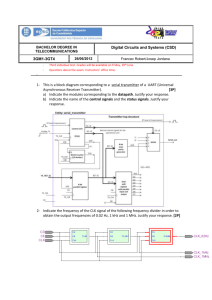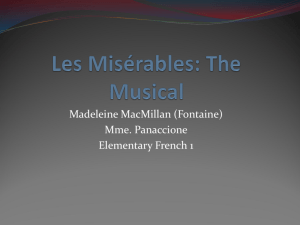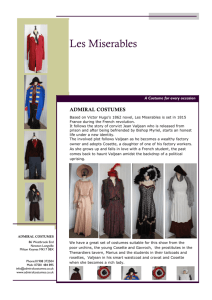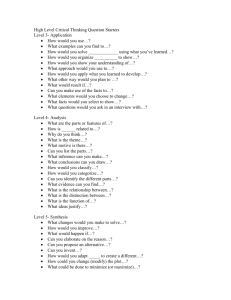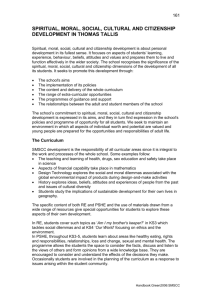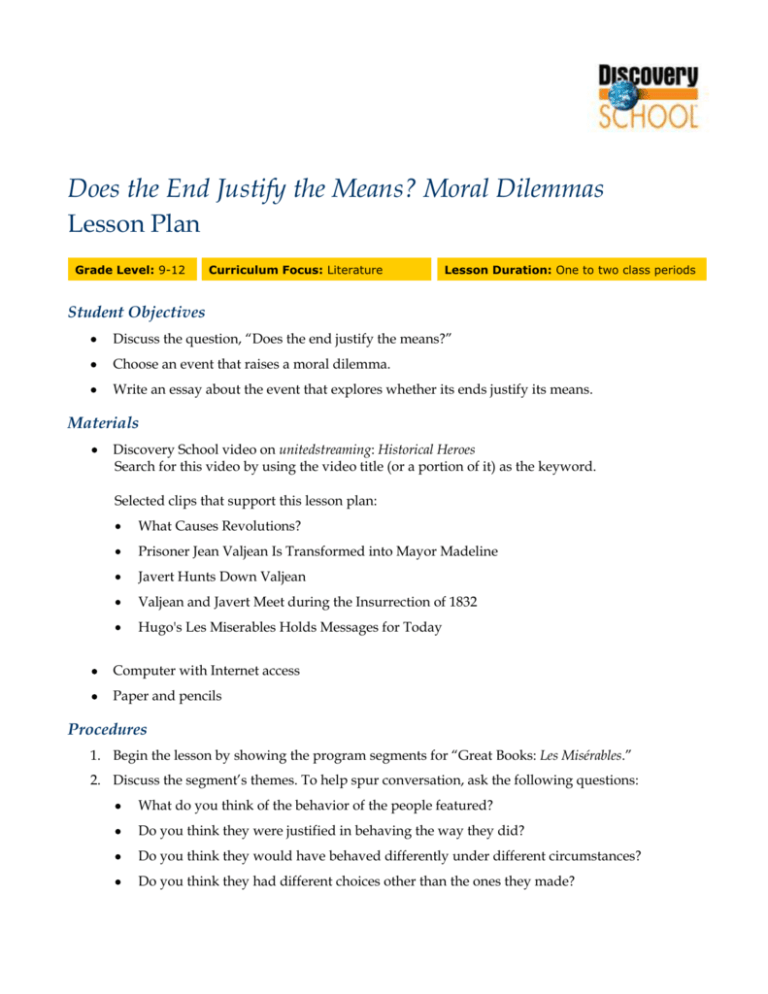
Does the End Justify the Means? Moral Dilemmas
Lesson Plan
Grade Level: 9-12
Curriculum Focus: Literature
Lesson Duration: One to two class periods
Student Objectives
Discuss the question, “Does the end justify the means?”
Choose an event that raises a moral dilemma.
Write an essay about the event that explores whether its ends justify its means.
Materials
Discovery School video on unitedstreaming: Historical Heroes
Search for this video by using the video title (or a portion of it) as the keyword.
Selected clips that support this lesson plan:
What Causes Revolutions?
Prisoner Jean Valjean Is Transformed into Mayor Madeline
Javert Hunts Down Valjean
Valjean and Javert Meet during the Insurrection of 1832
Hugo's Les Miserables Holds Messages for Today
Computer with Internet access
Paper and pencils
Procedures
1. Begin the lesson by showing the program segments for “Great Books: Les Misérables.”
2. Discuss the segment’s themes. To help spur conversation, ask the following questions:
What do you think of the behavior of the people featured?
Do you think they were justified in behaving the way they did?
Do you think they would have behaved differently under different circumstances?
Do you think they had different choices other than the ones they made?
Does the End Justify the Means? Moral Dilemmas
Lesson Plan
2
Did the ends ultimately justify the means?
3. Throughout the discussion, help students understand that people may behave in ways they
might not otherwise just to survive. It could be argued that Jean Valjean, the main character in
Victor Hugo’s masterpiece Les Misérables, fell into this category. This is often referred to as “the
ends justifying the means,” meaning that the result—in both cases, survival—is worth any
sacrifices made along the way.
4. Divide students into groups of three or four. Tell them that their challenge is to select an event
and explore it by asking questions similar to those in Step #2. Students may select any event
that raises a moral dilemma. Possible topics include:
War on terrorism
The invasion of Iraq
Heightened security procedures at airports and in public buildings
The use of negative ads in political campaigns
5. Allow enough class time to work on the project. Then, have each group write a short essay
explaining why in this event the ends do or do not justify the means. They may research the
topics on the Internet for more information, but students should use the assignment as an
opportunity to consider their own positions regarding difficult, often ambiguous, situations, as
well as the consequences of actions.
6. During the next class period, have students share their essays. What conclusions did they draw?
Did they find it difficult to answer the question? Encourage students to explain why they found
the assignment challenging.
7. Conclude the lesson by asking students what they learned from this activity. Did it make them
look at the world differently? Did it influence the way they assess the outcome of world events?
Poll the class to find out if they feel differently now than they did before the assignment when
asked, “Does the end justify the means?”
Assessment
Use the following three-point rubric to evaluate students’ work during this lesson.
3 points: Students participated actively in class discussions; considered the issues very
thoughtfully and carefully; worked well with their group in developing a well-constructed
essay.
2 points: Students participated somewhat actively in class discussions; considered the issues
thoughtfully and carefully; worked reasonably well with their group in developing a
competent essay.
1 point: Students did not participate in class discussions; had difficulty considering the
issues; had trouble working with their group in developing an essay.
Published by Discovery Education. © 2005. All rights reserved.
Does the End Justify the Means? Moral Dilemmas
Lesson Plan
3
Vocabulary
Les Misérables
Definition: Victor Hugo’s classic novel, published in 1862, explores the difficulty of leading an
honest life under cruel circumstances.
Context: Jean Valjean, the main character in Les Misérables, struggled to lead an honest,
productive life.
moral dilemma
Definition: A problem in which there is no clear right or wrong resolution
Context: If all your friends are cheating on a test, you are faced with a moral dilemma: Should
you tell the teacher or keep quiet so that you don’t lose your friends?
“The end justifies the means.”
Definition: An expression that says an individual, group, or nation is justified in taking action,
even if it’s morally questionable, to reach a goal or objective
Context: Many people believe that the bombing of Hiroshima and Nagasaki during World War
II was a case in which the ends justified the means because, although many people died, the
war came to an end.
Academic Standards
Mid-continent Research for Education and Learning (McREL)
McREL’s Content Knowledge: A Compendium of Standards and Benchmarks for K-12 Education
addresses 14 content areas. To view the standards and benchmarks, visit http://www.mcrel.org/.
This lesson plan addresses the following national standards:
Language Arts—Viewing: Uses viewing skills and strategies to understand and interpret
visual media; Writing: Uses the general skills and strategies of the writing process, Uses the
stylistic and rhetorical aspects of writing, Uses grammatical and mechanical conventions in
written compositions, Gathers and uses information for research purposes poses
The National Council for the Social Studies (NCSS)
NCSS has developed national guidelines for teaching social studies. To become a member of NCSS,
or to view the standards online, go to http://www.socialstudies.org
This lesson plan addresses the following thematic standards:
Individual Development and Identity
Power, Authority, and Governance
Civic Ideals and Practices
Published by Discovery Education. © 2005. All rights reserved.
4
the End Justify the Means? Moral Dilemmas
LessoDoes
Lesson Plan
n
Support Materials
Plan:Develop custom worksheets, educational puzzles, online quizzes, and more with the free teaching tools
on the Discoveryschool.com Web site. Create and print support materials, or save them to a
Doesoffered
Custom Classroom account for future use. To learn more, visit
http://school.discovery.com/teachingtools/teachingtools.html
the
End
Justif
y the
Mean
s?
Moral
Dile
mmas
Published by Discovery Education. © 2005. All rights reserved.

